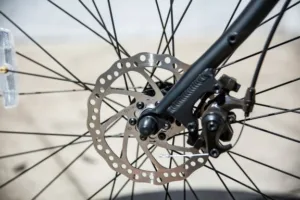Ah the age old battle of disc brakes vs. caliper brakes! Disc brakes and caliper brakes are of course the two primary brake systems used in cycling. Knowing the differences between them can help cyclists make the best decision when purchasing a bike or upgrading their braking system. Lets discuss the pros and cons.
Disc Brakes
Pros
Better Performance in Wet Conditions
Disc brakes offer more consistent braking performance in wet or muddy conditions. This is because the braking surface is located away from the wheel rim, which reduces the impact of water and debris on braking efficiency.
Improved Modulation
Disc brakes provide better modulation (the ability to apply a precise force), allowing cyclists to apply brakes with more control. This can be useful especially when navigating technical descents or tight corners.
Reduced Wear on Rims
Since disc brakes don’t rely on the wheel rim for braking, they help to extend the lifespan of the rims. Frequent riders in challenging terrain or bad weather get the most benefit from this quality.
Compatibility with Wider Tires
Disc brakes offer more clearance for wider tires, allowing enhanced traction and stability on many surfaces, including gravel roads and rough trails.
Cons
Higher Cost
Disc brake systems are usually more expensive upfront compared to caliper brakes. This includes the cost of the brake calipers, rotors, and compatible wheelsets.
Complex Maintenance
Maintaining disc brakes requires additional skills compared to caliper brakes. Tasks such as rotor alignment, pad replacement, and bleeding the hydraulic brake system are more complicated than the types of repairs for caliper brakes.
Weight Penalty
In some cases, disc brake systems can add weight to the bike compared to traditional caliper brakes. Advancements in technology have led to the development of lightweight disc brake components to mitigate this issue, but expect to pay more for this technology (as with all things lightweight in cycling).
Caliper Brakes
Pros
Simplicity
Caliper brakes are simple in design and easy to maintain. Routine maintenance tasks such as adjusting brake pads and cables can be performed with basic tools and minimal expertise.
Lightweight
Caliper brakes are generally lighter in weight compared to disc brakes, making them a preferred choice for cyclists who prioritize weight savings, such as road racers or competitive cyclists.
Lower Cost
Caliper brake systems are generally more affordable than disc brakes, and have been around for so long that they are now quite reliable.
Cons
Limited Performance in Wet Conditions
Caliper brakes rely on the wheel rim for braking, which is more problematic in wet or muddy conditions. Water and debris on the rim surface can compromise braking performance, resulting in longer stopping distances.
Rim Wear
Continuous braking causes wear and tear on the wheel rim. Over time, this can affect the structural integrity of the rim and require replacement ($$$!).
Compatibility with Wider Tires
Caliper brakes will have limited clearance for wider tires, restricting the choice of tire width for cyclists who prefer to ride on varied terrain or seek greater stability.
Considerations When Making a Purchase
Riding Conditions
Consider your typical riding conditions. If you frequently ride in wet or muddy terrain, disc brakes may offer better performance and reliability. Balance this with your budget and preferences of course.
Budget
Caliper brakes are generally more affordable upfront, while disc brakes may offer long-term benefits despite the initial higher cost. By and large though, caliper brakes will be the more budget friendly option.
Weight: If you prioritize weight savings, caliper brakes will be preferable. Advancements in disc brake technology have narrowed the weight gap between the two systems though, offering lightweight disc brake options for weight-conscious cyclists.
Bike Type and Riding Style
Consider the type of bike you ride and your riding style. Disc brakes are more commonly found on mountain bikes, gravel bikes, and hybrid bikes. Caliper brakes are more often used on road bikes, providing lightweight and aerodynamic advantages for competitive cycling.
Disc Brakes vs. Caliper Brakes – Conclusion
The choice of disc brakes vs. caliper brakes ultimately depends on your preferences and budget. We hope this article helps you to make a more informed decision when purchasing your next bike! For a look at our perspective on the closely related cost of bike tire cost spend, have a look at our recent article on the topic.




